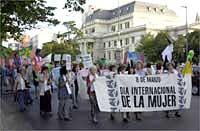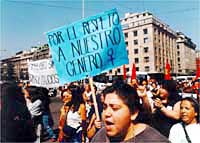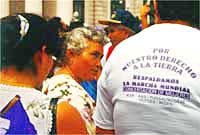Navigation
 Home
Home
 WHO WE ARE
WHO WE ARE
 OUR DEMANDS
OUR DEMANDS
 OUR ACTIONS
OUR ACTIONS
 OUR MAIN FIELDS OF ACTION: The Common Good and Access to Resources, Peace and demilitarisation, Women's Work and Violence against Women
OUR MAIN FIELDS OF ACTION: The Common Good and Access to Resources, Peace and demilitarisation, Women's Work and Violence against Women
 Become a member
Become a member
 News
News
 Agenda
Agenda
 Structure: IC, Countries and Participating bodies, International meetings
Structure: IC, Countries and Participating bodies, International meetings
 Newsletters
Newsletters
 Publications
Publications
 2000 - Sexism and Globalization, 2000 Good Reasons to March
2000 - Sexism and Globalization, 2000 Good Reasons to March
 2003 World Social Forum
2003 World Social Forum
 A Change of Course, The Millenium Development Goals (MDGs) through the Lens of the Women's Global Charter for Humanity, August 2005
A Change of Course, The Millenium Development Goals (MDGs) through the Lens of the Women's Global Charter for Humanity, August 2005
 A Score for Women’s Voices
A Score for Women’s Voices
 Advocacy Guide to Women's World Demands, 2000
Advocacy Guide to Women's World Demands, 2000
 Appeal of the World March of Women for the Construction of a Just, Equal, Cooperative, Democratic and Peaceful World
Appeal of the World March of Women for the Construction of a Just, Equal, Cooperative, Democratic and Peaceful World
 Changing the World Step by Step, 2000
Changing the World Step by Step, 2000
 ECONOMICS IN QUESTION: A WOMEN’S PERSPECTIVE
ECONOMICS IN QUESTION: A WOMEN’S PERSPECTIVE
 G8 AND WOMEN: WORLDS APART
G8 AND WOMEN: WORLDS APART
 Information about demand V-6 concerning sex trafficking of women and girls
Information about demand V-6 concerning sex trafficking of women and girls
 Information Document on Lesbian Rights (1999)
Information Document on Lesbian Rights (1999)
 Letter to Kofi Annan, UN General Secretary, October 17, 2000
Letter to Kofi Annan, UN General Secretary, October 17, 2000
 Letter to the IMF and the World Bank, October 16, 2000
Letter to the IMF and the World Bank, October 16, 2000
 Supporting Document 1 to the Charter
Supporting Document 1 to the Charter
 Supporting Document 2 to the Charter
Supporting Document 2 to the Charter
 The World March of Women 1998-2008: A Decade of International Feminist Struggle
The World March of Women 1998-2008: A Decade of International Feminist Struggle
 The World March of Women 2010 - Third International Action
The World March of Women 2010 - Third International Action
 WMW at the Global Forum on Financing the Right to Sustainable and Equitable Development
WMW at the Global Forum on Financing the Right to Sustainable and Equitable Development
 Women on the March, 2002
Women on the March, 2002

|
April 2002 - Actions to Revolutionize the World
 |
|
Women's Marching Feet Echo around the World
ARGENTINA

Above: The March is launched on March 8 in Buenos Aires.
|
Amid a flurry of marches, actions to collect signatures, seminars, meetings of women in unions, and information given out in schools, Argentine activists managed to get the country's Congress, Senate and a number of regional and municipal councils to declare the March of national, provincial and municipal interest. The Mothers of the Plaza de Mayo and Nobel Peace Prize Laureate Adolfo Pérez Esquivel, among others, backed the March. |
The efforts made in the year 2000 (creating posters, holding workshops about the effects of globalization on women) continued in Bolivia. Despite an economic crisis that was "hitting the poorest sectors very hard", women went ahead with their actions. They broadcast a weekly radio program and published En marcha, a magazine for "women with no voice and no rights, women in different parts of the world who are forced to be submissive and silent." |
BOLIVIA

Above: "Women and Men for Change," in the first issue of En Marcha.
|
CHILE

Above: The March in Santiago, Chile, on March 8, 2000 drew 6000 people. |
March actions kicked off on March 8 in the capital city of Santiago with a parade of floats alluding to the March demands. Chilean women were calling for full citizenship for themselves, and they were working to have a law adopted that would authorize divorce - still prohibited in Chile. They also pressed for the "morning after" pill to be sold in their country.
|
On March 8 and October 17, 2000, Salvadoran women marched to defend the goals of the World March. In this small country, battered by natural disasters and trying to recover from civil war, every demand was considered a priority. Grass-roots women, women involved in the Church, lesbians, groups acting against violence, and individual women all mobilized. |
EL SALVADOR

Above: Women demand access to land at the launch of the March in San Salvador on March 8, 2000. |
|

|
Copyrights
:
CC by-nc-sa 2.0
Last modified
2006-03-23 03:09 PM
This item is available in
Français,
English,
Español
|
|







